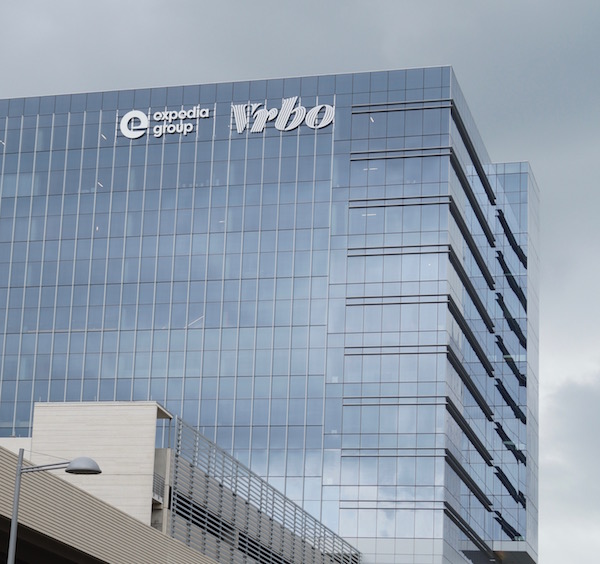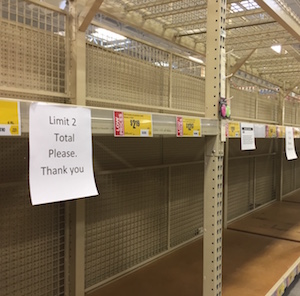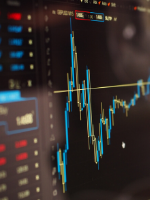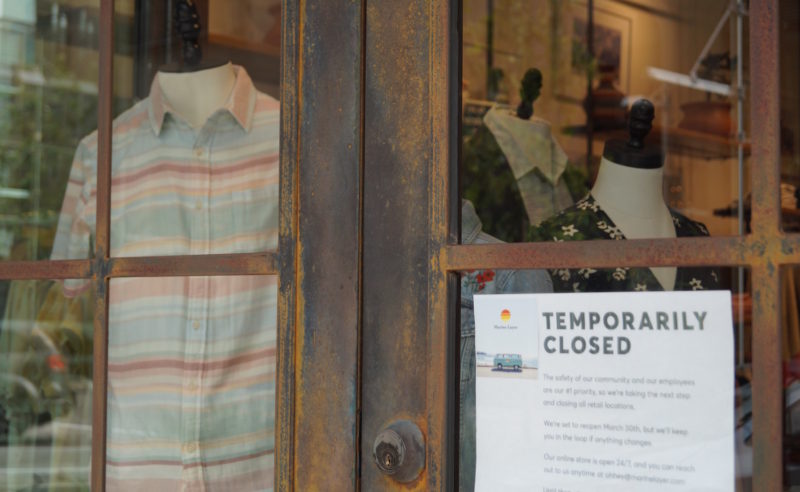By Daniel Van Oudenaren
From retail to energy to real estate, the COVID-19 outbreak is hitting the Texas economy hard.
It’s too early to tell what the human toll will be, and too early to predict how long the epidemic may last. But already we can point to ways that Texans are being affected in their daily lives, or soon will be. Here are just a few.
1. Restaurants and Hotels
Bars and restaurants were already hit hard by the cancellation of travel-related events like SXSW. But the real black day came Tuesday, March 17. That’s when Austin, Dallas, and Houston said all dine-in spaces had to close.
Drive-through and home-delivery establishments could pick up some of the slack, but most restaurants and bars are telling hourly staff to stay home. Waiters, bartenders, and baristas all face an uncertain future without a steady paycheck and tips.
2. Retail
Tuesday was also a black day for retailers. Macy’s, Nordstrom, and hundreds local stores closed their doors. Nike, Apple, Urban Outfitters, and some other big chain retailers already had closed in the previous days.
Some of these retailers, including Apple, have said that hourly workers will continue to be paid. That should help offset the economic impact for workers, but not for the businesses themselves.
Home-delivery retailers like Amazon will try to step into the void. But Amazon faces challenges, including the risk of infection within its own workforce, and strain on its supply chain. Customer orders for low-margin staple products have spiked, while deliveries of some more profitable luxury and entertainment products are on hold.

3. Residential Real Estate
Before the outbreak, unemployment in Texas was historically low, a measure that tends to boost home prices. Tech hiring and investment also were going strong. But now, layoffs and hiring freezes are hitting the workforce. South by Southwest, Circuit of the Americas, and Expedia all have recently laid off workers, to name just a few.
As unemployment rises and wages drop, fewer people will be out looking for a home to buy. That could pressure homebuilders into offloading inventory at lower prices.
James P. Gaines, the chief economist with the Real Estate Center at Texas A&M University, says that “COVID-19 has significantly shocked the economy and financial markets, lowering growth expectations and increasing uncertainty that could derail Texas’ continued economic expansion.”
“This untimely disruption to overall economic activity will likely affect Texas’ housing markets, even in an environment of historically low mortgage rates… The fear of contamination and spread of the virus may keep both buyers and sellers on the sidelines for some time.”
4. Commercial Real Estate
When companies like Expedia lay off workers, they need less office space. That’s a factor that’s just starting to ripple through the economy.

The Wall Street Journal reported March 17, “The Houston office market is poised to become the next commercial real estate victim of the economic shock waves from the coronavirus crisis.”
“Owners, brokers and others in its office market are bracing themselves for layoffs, bankruptcies and downsizings that will translate into lower rents, higher vacancies and foreclosures… Defaults in the Houston office market already are rising,” the paper reported.
Long-term economic drivers could help the office market to stay afloat and rebound after the coronavirus outbreak passes, but at the very least, we are likely to see prices hit ‘pause.’
5. Oil and Gas
Massive quarantines and factory shutdowns in China earlier this year suppressed demand for oil, harming oil-exporting states like Texas. Now the same dynamic is playing out in the U.S. and Europe. Demand for jet fuel is also down.
Falling demand coincides with a rise in supply, caused by a market feud between Saudi Arabia and Russia. “Texas has exposure if oil prices remain depressed for a sustained period of time,” wrote Texas Comptroller Glenn Hegar in a statement last week.
6. Groceries and Other Consumer Staples
If you’ve taken a trip to H-E-B, Walmart, or Whole Foods you’ve seen how Texans are responding to the coronavirus scare: Hunkering down, cooking more meals at home, and stocking up.

These consumer behaviors help to offset the economic shock of shutdowns in other parts of the retail economy. But really they are only a short-term driver, pushing future spending into the present. For example, if someone buys a large amount of toilet paper this month, that person is unlikely to buy that product again next month, even if they normally would have done so.
7. Public Sector
Texas local governments are closing schools, scaling back services like public transit, and sending workers home from government offices. Those moves will have short-term negative impacts as governments hire less and spend less money with private suppliers.
Longer term, declines in state tax revenue — including sales tax, oil severance tax, and property tax — could bite into government spending and erode the political will to tax, borrow, and spend. Those factors could affect public sector growth for years to come.
On the other hand, federal stimulus measures are getting underway, some of which are likely to filter down through the state and local governments. Those measures are intended to curb the economic impact of the virus and contribute to a sharp economic rebound.
8. Banks
Texas banks are squeezed on two sides by the COVID-19 scare. When scared or unemployed customers draw down deposits, banks have less money on hand to maintain capital requirements and fund their loans and other investments. The same is true when business clients draw down deposits or credit lines to make payments as their sales decline.
On the lending side, Texas banks are exposed to risky parts of the economy, especially oil and commercial real estate (CRE). As a share of total lending, about 5% of the total lending of Dallas-based Texas Capital Bank is in energy loans, and 11% of San Antonio’s Cullen/Frost Bank is in energy loans, according to a WSJ report dated March 16.
These same banks also have heavy loan exposure to the commercial real estate sector. A downturn in both oil and CRE simultaneously could spell trouble for regional banks.
Emergency rate cuts by the Federal Reserve on March 15 also harm banks. Banks profit from the difference or ‘spread’ in interests rates between their loans and deposits; low rates make it more difficult for banks to lend at profitable rates of interest.
However, customers shouldn’t worry about whether bank failures could affect their own accounts. The Federal Deposit Insurance Corporation insures bank deposits up to $250,000.
9. Financial Markets

Financial markets like the New York Stock Exchange and the NASDAQ are sometimes not considered part of the ‘real economy,’ because they are speculative markets. While that is true, the financial markets and the real economy are highly interwoven.
For example, the scare on Wall Street could make it more difficult for an Austin or Dallas tech startup to raise venture capital money in Silicon Valley or New York. That in turn would dampen hiring locally, reduce demand for office space, and further fuel the downturn in the real economy.
Additionally, more than half of Americans own stocks, according to a Gallup poll last year. When they look at their investments or retirement accounts and see how badly they’ve been slammed, they may be less eager to go out to spend money on luxuries or entertainment.
10. Healthcare
Texas has robust and growing healthcare and biotechnology sectors. The coronavirus likely will only add to demand for these services. Both governments and the private sector are looking to pour money into healthcare innovation as the epidemic spreads. While there will still be winners and losers within these sectors, overall they should continue to grow.
